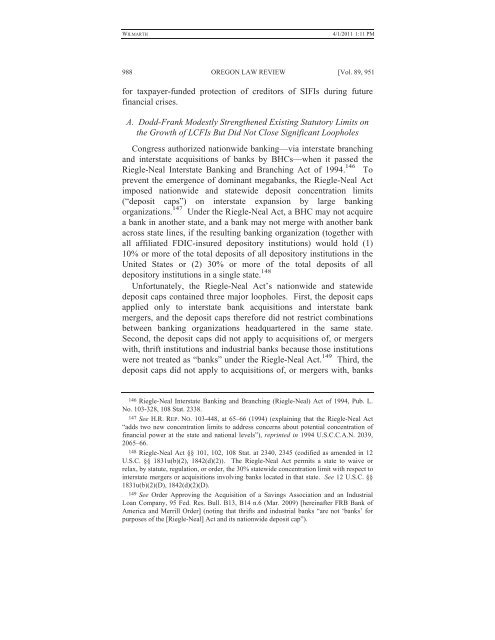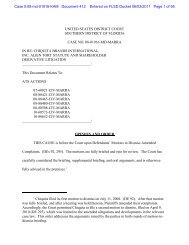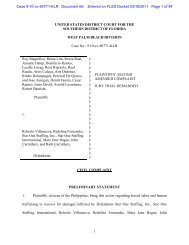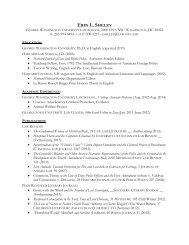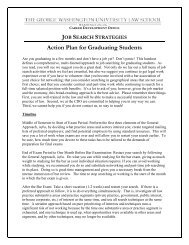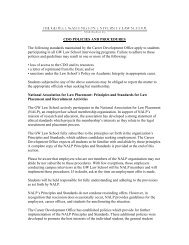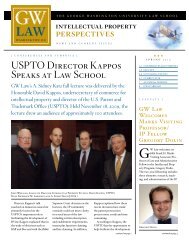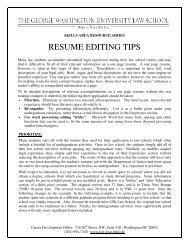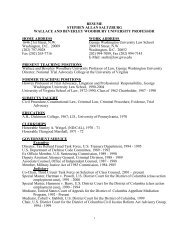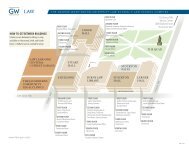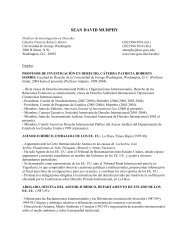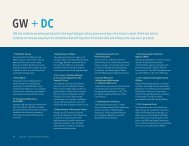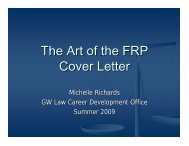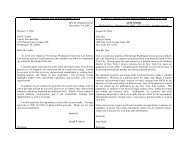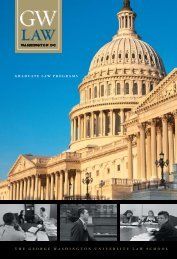CLE Materials for Panel #1 - George Washington University Law ...
CLE Materials for Panel #1 - George Washington University Law ...
CLE Materials for Panel #1 - George Washington University Law ...
Create successful ePaper yourself
Turn your PDF publications into a flip-book with our unique Google optimized e-Paper software.
WILMARTH<br />
4/1/2011 1:11 PM<br />
988 OREGON LAW REVIEW [Vol. 89, 951<br />
<strong>for</strong> taxpayer-funded protection of creditors of SIFIs during future<br />
financial crises.<br />
A. Dodd-Frank Modestly Strengthened Existing Statutory Limits on<br />
the Growth of LCFIs But Did Not Close Significant Loopholes<br />
Congress authorized nationwide banking—via interstate branching<br />
and interstate acquisitions of banks by BHCs—when it passed the<br />
Riegle-Neal Interstate Banking and Branching Act of 1994. 146 To<br />
prevent the emergence of dominant megabanks, the Riegle-Neal Act<br />
imposed nationwide and statewide deposit concentration limits<br />
(“deposit caps”) on interstate expansion by large banking<br />
organizations. 147 Under the Riegle-Neal Act, a BHC may not acquire<br />
a bank in another state, and a bank may not merge with another bank<br />
across state lines, if the resulting banking organization (together with<br />
all affiliated FDIC-insured depository institutions) would hold (1)<br />
10% or more of the total deposits of all depository institutions in the<br />
United States or (2) 30% or more of the total deposits of all<br />
depository institutions in a single state. 148<br />
Un<strong>for</strong>tunately, the Riegle-Neal Act’s nationwide and statewide<br />
deposit caps contained three major loopholes. First, the deposit caps<br />
applied only to interstate bank acquisitions and interstate bank<br />
mergers, and the deposit caps there<strong>for</strong>e did not restrict combinations<br />
between banking organizations headquartered in the same state.<br />
Second, the deposit caps did not apply to acquisitions of, or mergers<br />
with, thrift institutions and industrial banks because those institutions<br />
were not treated as “banks” under the Riegle-Neal Act. 149 Third, the<br />
deposit caps did not apply to acquisitions of, or mergers with, banks<br />
146 Riegle-Neal Interstate Banking and Branching (Riegle-Neal) Act of 1994, Pub. L.<br />
No. 103-328, 108 Stat. 2338.<br />
147 See H.R. REP. NO. 103-448, at 65–66 (1994) (explaining that the Riegle-Neal Act<br />
“adds two new concentration limits to address concerns about potential concentration of<br />
financial power at the state and national levels”), reprinted in 1994 U.S.C.C.A.N. 2039,<br />
2065–66.<br />
148 Riegle-Neal Act §§ 101, 102, 108 Stat. at 2340, 2345 (codified as amended in 12<br />
U.S.C. §§ 1831u(b)(2), 1842(d)(2)). The Riegle-Neal Act permits a state to waive or<br />
relax, by statute, regulation, or order, the 30% statewide concentration limit with respect to<br />
interstate mergers or acquisitions involving banks located in that state. See 12 U.S.C. §§<br />
1831u(b)(2)(D), 1842(d)(2)(D).<br />
149 See Order Approving the Acquisition of a Savings Association and an Industrial<br />
Loan Company, 95 Fed. Res. Bull. B13, B14 n.6 (Mar. 2009) [hereinafter FRB Bank of<br />
America and Merrill Order] (noting that thrifts and industrial banks “are not ‘banks’ <strong>for</strong><br />
purposes of the [Riegle-Neal] Act and its nationwide deposit cap”).


